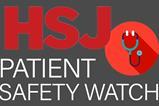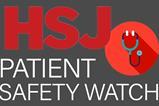HSJ is now hosting the Patient Safety Watch newsletter, written by Patient Safety Watch chief executive James Titcombe.
Good afternoon and welcome to this edition of the Patient Safety Watch newsletter
This edition goes to press shortly before World Patient Safety Day on 17 September. This year’s theme is “Engaging Patients for Patient Safety”, marked officially by a WHO Conference in Geneva earlier this week. Sir Liam Donaldson (a patient safety hero in my book) opened the event by calling for a culture where patients have space to be educators, storytellers, advocates, partners and insight bringers.
An important and uplifting message that resonates with several of the items in this edition.
Aftershocks from Letby continue
The healthcare community has continued to grapple with the Letby case this fortnight. News that the forthcoming inquiry will now be on a statutory footing has been widely welcomed, although much of the debate has focused on regulating NHS managers, first recommended in the 2018 Kark Review.
Shadow health secretary Wes Streeting has promised Labour would introduce this if voted into power, being quoted by The Guardian as saying: “NHS leaders have enormous responsibility for the health of their patients, yet currently face less regulation than bank managers… Labour will introduce this in office, and make sure those found guilty of serious misconduct are disbarred.”
And speaking on BBC Newsnight, Sir Robert Francis said the time had come for professional regulation of NHS managers to be considered again.
Meanwhile, Health Ombudsman Rob Behrens told the Guardian that while the Letby inquiry’s first duty will be to “give families… victims the answer they want”, it must also explore “cover-up culture”.
It’s clear a tipping point has been reached and some form of regulation for NHS managers seems inevitable. However, we also need to consider the wider factors that influence the culture Mr Behrens describes and the levers and incentives that enable it. Regulation alone has a poor track record of changing culture and I hope any changes are made as part of a wider review of NHS leadership and culture.
Martha’s Rule to be taken forward
I’m sure most readers will already know about Martha Mills. Martha tragically died aged 13 in 2021 after sustaining a pancreatic injury from an everyday bike accident while on holiday with her family. The inquest into her death heard she would likely have survived had consultants moved her to intensive care sooner.
Martha’s parents Merope and Paul have been central to campaigning for Martha’s rule “to amplify patient voice and improve safety in hospitals”. The rule would give patients, their parents or their carers the right to easily call for a rapid review or second opinion from a doctor (in the same hospital) if they have a serious concern.
Similar schemes have already been successfully implemented both internationally and in the NHS.
In a parliamentary statement earlier this month, Mr Barclay said his department was exploring a possible “three-step process that allows patients or their families to request a clinical review of their case from a doctor or nurse if their condition is deteriorating or not improving as expected”.
As this newsletter was being finalised, the government confirmed a commitment to ensure Martha’s rule is implemented across the NHS “as quickly as possible” and has asked patient safety commissioner Henrietta Hughes to work with NHSE on this. Mr Barclay told the BBC Today programme: “It is, I think, for everyone that’s heard [Martha’s story] an absolutely heartbreaking case and I am determined that we ensure we learn the lessons from it.”
It’s a huge achievement for Martha’s incredible parents and a legacy for Martha that will likely save countless lives.
In other news this edition…
Increase in stillbirths for first time since 2013
The annual perinatal mortality report from Mothers and Babies: Reducing Risk through Audits and Confidential Enquiries (MBRRACE-UK), published this week, has highlighted widening inequalities, with babies of black ethnicity more than twice as likely to be stillborn compared with white babies.
Overall, stillbirths in 2021 (the most recent data reported by MBRRACE-UK) increased to 3.54 per 1,000, from 3.33 per 1,000 in 2020, the first year-on-year increase since 2013.
Robert Wilson, head of the Sands and Tommy’s Joint Policy Unit, told the Independent the report “paints an alarming picture of baby loss throughout the UK and the situation described… is simply unacceptable”.
Police confirm investigation into maternity care at Nottingham
Nottinghamshire police have announced a criminal investigation into maternity failings at Nottingham University Hospitals Trust. The trust is also the subject of an independent review by senior midwife Donna Ockenden.
In a statement, Nottinghamshire police chief constable Kate Meynell said: “We want to work alongside the review but also ensure that we do not hinder its progress. However, I am in a position to say we are preparing to launch a police investigation. We plan to hold preliminary discussions with some local families in the near future.”
A statement issued on behalf of some of the affected parents, and published by the Guardian, welcomed the police investigation, adding: “There will be a wealth of information from victim families for [the police] team to use.”
Concerns relating to Derby and Burton’s maternity services emerge
The Derby Telegraph reports University Hospitals of Derby and Burton Foundation Trust’s maternity services have been added to NHSE’s Maternity Safety Support Programme.
The local paper said the entry into the national programme came after a Healthcare Safety Investigation Branch report earlier this year and a visit from the regional perinatal team last year. A letter sent to the trust about its entry into MSSP summarised various safety issues raised by these earlier investigations, including an incident where a baby was given an unnecessary lumbar puncture after being “mislabelled”.
Government launches consultation on industry payments disclosure
The DHSC is consulting on whether to require manufacturers and other commercial suppliers of “medicines, devices and borderline substances” to disclose payments to the healthcare sector. This builds on Baroness Julia Cumberlege’s First Do No Harm review, which recommended the mandatory reporting of such payments in a bid to improve transparency.
Introducing the consultation, health minister Will Quince wrote: “To build trust and protect the health system from real and perceived conflicts of interest, we must understand and support the important ways in which industry interacts with the healthcare profession.”
The consultation runs until 16 October.
NHSE launches sexual safety charter
NHSE launched its first sexual safety charter earlier this month, with those signing up pledging to take a zero-tolerance approach “to any unwanted, inappropriate and/or harmful sexual behaviours within the workplace”. Signatories are also expected to implement 10 core principles by July 2024.
In a letter, NHSE chief delivery officer Steve Russell thanked organisations for their “support to help ensure the NHS is a safe space for staff and patients, and a place in which sexual misconduct, violence, harassment or abuse will not be tolerated”.
Shortly after NHSE revealed the charter, a BBC News investigation revealed sexual harassment was rife among surgeons, with some female surgeons telling the broadcaster they had been sexually assaulted as surgery was taking place in an operating theatre.
The shocking issues have also been bravely brought to the fore by female surgeons in a powerful – must-read – Times article by Rachel Silvester.
But perhaps demonstrating the problem even more powerfully was a letter published in the Times from retired doctor Peter Hinton, which has since been widely condemned. I won’t draw attention to the letter itself, but the response from 55 consultants at Swansea Bay is well worth a read – and perhaps a reason for optimism?
Sharing some good stuff
Updated ‘Learn Together’ resources published
To coincide with this year’s World Patient Safety Day theme, the ‘Learn Together’ project has published updated guidance and resources to support the meaningful involvement of patients and families in Patient Safety Incident Investigations. The resources have been generated from an independent research programme, and co-designed by a community of stakeholders including patients and their families, patient safety managers, people who investigate, healthcare staff, legal representatives, and policymakers. In my view, they offer an invaluable compass for families, patients and healthcare professionals which will help minimise compounded harm and support healing as well as learning. If there is a patient safety team out there not making use of these resources, you are missing out!
NHSE marks World Patient Safety Day
Leading up to and after World Patient Safety Day, NHSE is sharing a range of videos, podcasts and blogs to show some of the work that is happening across the NHS to engage patients with patient safety. I had a look and think there is some really valuable stuff that will be of use to both NHS organisations as well as for patients, family members or carers.
Free online course: How the health system in England really works
If you are confused about how the health system in England works, you’re not alone. This free course from the King’s Fund aims to explain the building blocks making up England’s healthcare system through videos, articles and quizzes. This sounds like something that would be invaluable, particularly for people new to the NHS, including those taking on new roles such as patient safety partners.
Baby Lifeline National Maternity Safety Conference – Thursday 21 September
For several years now, the charity Baby Lifeline has hosted the National Maternity Safety Conference in Birmingham and this year’s programme is looking more important and better than ever – and tickets are close to selling out, so be quick!
In signing off for this edition, I’m mindful that next week is an important one for the patient safety community as the HSJ Patient Safety Congress takes place in Manchester on Monday and Tuesday. This year’s theme is ‘Facing Reality: Honest conversations around safety’.
These newsletters, by their nature, tend to focus on problems and where things aren’t going well. Even so, there is no escaping that the news recently relating to patient safety has felt (to me at least) much more difficult and serious than I can recall for a long time. The need for honest conversation has never been greater – the HSJ Congress is always an important forum for discussion about solutions and an opportunity for new collaborations and I hope to see many friends and colleagues there.
That’s all for now. Thanks for reading and stay safe.
James Titcombe
































No comments yet